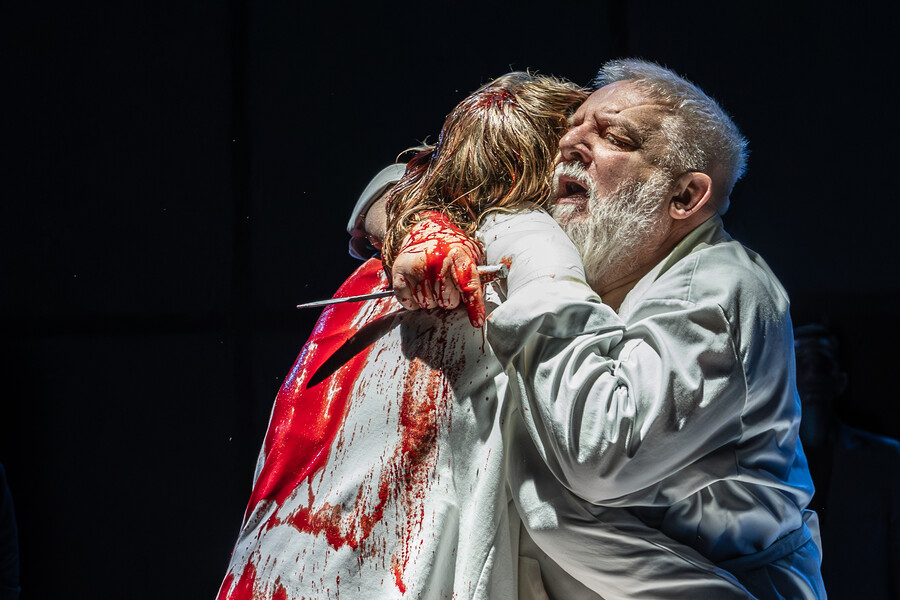
17 April – 7 June
If you’ve never experienced Shakespeare’s bloodiest and most brutal play, now is your chance. Max Webster’s debut production for the Royal Shakespeare Company is not just powerful and terrifying, it offers us a Titus Andronicus which touches on the roots of the violence it presents.
Titus is a fictional general in an imaginary Rome. The play combines the worst excesses of empire with late 16th century preoccupations to create a gruesome scenario of revenge. In this modern reimagining, there are uncomfortable glimmers of our own age of cruelty.
On first reading of the text, Titus is a crude and merciless military man. But Simon Russell Beale’s distinctive interpretation brings a further dimension to the role, and we come to see him as a forerunner of Lear, another father distraught with grief over the fate of his daughter. The actor’s voice is mesmerising, its fine modulations hinting at ever deeper levels of irony and complexity. One significant cut in this version excludes the murder of his own son in the first scene, thus allowing the hero to attract a flicker of sympathy from the start.
He is well matched by his two antagonists, Aaron, ‘the Moor’ (Natey Tone) and Tamora, Queen of the Goths, (Wendy Kweh). Tone’s Aaron draws us with him down the bitter road from oppression to anger and an all-encompassing hatred for his many enemies. When the Romans capture him, he confesses his guilt with glee, climbing a ladder towards his own noose, glorying in his pivotal role in the rape and mutilation of Titus’ daughter Lavinia. It’s a horrific moment with clear echoes of racial lynching. Yet such is the power of his performance that unless our eyes and ears are very tightly shut, we are drawn ineluctably into his twisted mind.
As for Tamora, she is his equal in maleficence. Kweh gives a great physical performance, every quicksilver gesture an expression of her love, lust and desperation. She is deceitful, manipulative, and hard to pin down, but for the one true thing about her, her desire for vengeance.
Her surviving sons (Jeremy Ang Jones and Marlowe Chan-Reeves) are terrifyingly credible as murderers and rapists, laughing and playful as they brandish their predatory masculinity. And Letty Thomas is heart breaking as their victim, Lavinia, ravished and broken, still managing to express her torment with neither hands nor tongue.
Joanna Scotcher’s design employs a sombre grey palette on a bare stone platform. Low frequency sounds add to the sense of menace. Minimal props, tables and chairs are carried on and off by the cast with elaborate, somewhat distracting, balletic movements.
Some of the violence is stylised, but the surfeit of blood means this show is not for the squeamish. A channel around the playing area collects falling bodies. Implements of torture drop from the ceiling. White plastic mats are tugged centre stage to protect the surface from the butchery. At times, the sheer excess of gore becomes ludicrous, provoking nervous audience titters. And there are dark jokes within the script, culminating in the infamous dinner party when Titus feeds Tamora with a pie filled with the entrails of her dead sons.
In witnessing this pornography of carnage, the innocent and sensitive observer can feel a trifle wobbly. On the morning after, it’s possible to shake off the physical reactions and acknowledge the marvel of Shakespeare’s original text and the achievement of this fine company in bringing it to 21st century life.
★★★★☆ Ros Carne 30 April 2024
Photography credit: Marc Brenner


